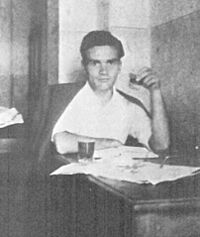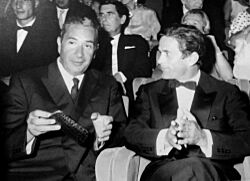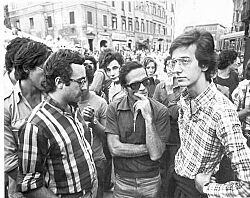Pier Paolo Pasolini facts for kids
Quick facts for kids
Pier Paolo Pasolini
|
|
|---|---|
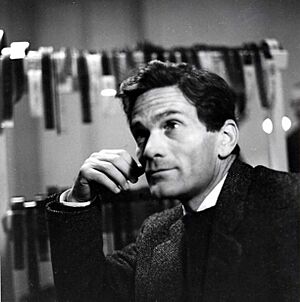
Pasolini in 1964
|
|
| Born | 5 March 1922 Bologna, Italy |
| Died | 2 November 1975 (aged 53) Ostia, Italy |
| Occupation |
|
| Alma mater | University of Bologna |
| Signature | |
Pier Paolo Pasolini (born March 5, 1922 – died November 2, 1975) was a famous Italian poet, film director, writer, and actor. He is seen as one of the most important public thinkers in 20th-century Italian history. He was very influential as both an artist and a political figure. He is well-known for directing movies like The Decameron, The Canterbury Tales, and Arabian Nights. These films are part of his "Trilogy of Life."
Pasolini was a controversial person because of his direct style. His impact is still talked about today. He was a strong supporter of bringing back old languages and traditional values when he was young. After World War II, he became a Marxist, which means he believed in a society where everyone is equal. He strongly criticized Italian middle-class society. He felt that American culture, a decline in values, and too much focus on buying things were harming Italian culture. Pasolini was a key figure in the intellectual scene in Rome after the war. He became a major name in European literature and film.
Pasolini's tragic death in Ostia in November 1975 caused a huge stir in Italy. It continues to be a topic of much discussion.
Contents
Biography
Early Life and Education
Pier Paolo Pasolini was born in Bologna, Italy, on March 5, 1922. Bologna is known for its political history. His mother, Susanna Colussi, was an elementary school teacher. His father, Carlo Alberto Pasolini, was a lieutenant in the Italian Army.
His family moved several times when he was young. They lived in places like Conegliano, Belluno, and Casarsa della Delizia. In 1926, his father faced some legal trouble. His mother then moved with the children to her family's home in Casarsa della Delizia. Pasolini started writing poems at age seven. He was inspired by the beautiful nature around Casarsa.
Pasolini found it hard to move so often. However, he read many books and poems by famous writers like Dostoyevsky and Shakespeare. In high school in Reggio Emilia, he met his first close friend, Luciano Serra. They later met again in Bologna. Pasolini spent seven years finishing high school there. He also developed new interests, including football. He formed a group with friends to discuss literature.
In 1939, Pasolini finished high school. He then went to the Literature College of the University of Bologna. There, he learned about subjects like philology (the study of language in historical texts) and the beauty of figurative arts. He also often went to the local cinema club. Pasolini began to include parts of the Friulan language in his poems. Friulan is a minority language he learned just for his poetry. In 1943, he started the Academiuta della lenga furlana (Academy of the Friulan Language) with other students.
During World War II, Pasolini was drafted into the Italian Army. After his group was captured by the Germans, he escaped. He fled to Casarsa, where he stayed for several years.
Early Poetry and Challenges
In 1942, Pasolini published his first collection of poems in Friulan. It was called Poesie a Casarsa. He had written these poems when he was eighteen. Important writers and critics noticed and liked his work. Pasolini also became the chief editor of a magazine called Il Setaccio ("The Sieve"). However, he was fired after disagreements with the director, who supported the Fascist government. These experiences made Pasolini change his mind about Fascism. He slowly started to support Communist ideas.
Pasolini's family stayed in Casarsa during Second World War. From May 1944, he and others published a magazine called Stroligùt di cà da l'aga. Casarsa faced bombings and forced military service during the war. Pasolini tried to stay away from these conflicts. In October 1943, he and his mother taught students who could not go to regular schools. This teaching group was considered illegal and stopped in February 1944.
His brother Guido, who was 19, joined a resistance group. On February 12, 1945, Guido was killed in an ambush. This event deeply saddened Pasolini and his mother. Six days after his brother's death, Pasolini helped found the Friulan Language Academy. In November 1945, Pasolini graduated from university. His final paper was about the poet Giovanni Pascoli.
In 1946, Pasolini published another small poetry collection, I Diarii ("The Diaries"). In October, he traveled to Rome. The next May, he started writing his Quaderni Rossi (Red Notebooks). He also finished a play in Italian, Il Cappellano. His poetry collection, I Pianti ("The Cries"), was also published.
Moving to Rome
In January 1950, Pasolini moved to Rome with his mother, Susanna. They wanted to start a new life. For three years, they lived in a poor suburb called Rebibbia, near a prison. Pasolini found inspiration in this Roman suburb. It was one of the "borgate," where poor immigrants lived in difficult conditions. Instead of asking other writers for help, Pasolini chose to find his own way.
Pasolini found a job at the Cinecittà film studios. He also sold his books at sidewalk shops in Rome. In 1951, he became a secondary school teacher in Ciampino, just outside Rome. He had a long commute and earned a small salary.
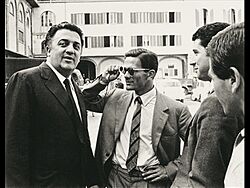
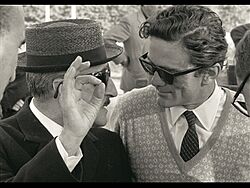
Career and Works
Writing Career
In 1954, Pasolini left his teaching job. He moved to the Monteverde area of Rome. He published La meglio gioventù, his first important collection of Friulan poems. His first novel, Ragazzi di vita (English: Hustlers), came out in 1955. This book described the lives of poor people in Rome. It was very successful but was not well-received by the Italian Communist Party (PCI) or the Italian government.
In 1955, Pasolini helped create and publish a poetry magazine called Officina. The magazine ran for fourteen issues until 1959. That year, he also published his second novel, Una vita violenta. This book was liked by the Communist cultural groups. He then wrote a column for the PCI magazine Vie Nuove from 1960 to 1965. These writings were later published as a book called Le belle bandiere (The Beautiful Flags). In the late 1960s, Pasolini also wrote an advice column for the news magazine Tempo.
In 1966, Pasolini wrote a film script about the apostle Saint Paul. This film was never made, but he later revised the script. Pasolini wanted to show Paul as a modern person without changing his original ideas. In Pasolini's story, Paul is a supporter of a fascist government who changes his views. He becomes enlightened and joins a resistance movement. The script follows Paul as he preaches resistance in different cities.
In 1970, Pasolini bought an old castle near Viterbo, north of Rome. There, he started writing his last novel, Il Petrolio. In this book, he wrote about secret dealings in high levels of government and big companies. The novel was not finished when he died. In 1972, Pasolini started working with the far-left group Lotta Continua. He made a documentary called 12 dicembre about a bombing in Milan. The next year, he began writing for Italy's most famous newspaper, Il Corriere della Sera. In early 1975, a collection of his essays, Scritti corsari ("Corsair Writings"), was published.
Major Written Works
- Ragazzi di vita (The Ragazzi, 1955)
- Una vita violenta (A Violent Life, 1959)
- La meglio gioventù (1954)
- Le ceneri di Gramsci (1957)
- Empirismo eretico (1972)
- Scritti corsari (1975)
Film Career
In 1957, Pasolini helped Federico Fellini with his film Le notti di Cabiria. He wrote dialogue for the Roman dialect parts. Fellini also asked him to work on dialogue for La dolce vita. Pasolini first acted in Il gobbo in 1960. He also helped write Long Night in 1943.
Pasolini's first film as a director and writer was Accattone in 1961. It was set among the poor communities of Rome. The film showed the lives of thieves, which was a contrast to Italy's economic recovery after the war. The film caused controversy, and some conservatives wanted stricter censorship. In 1963, a part of his film RoGoPaG was censored. Pasolini was put on trial for "offense to the Italian state and religion."
During this time, Pasolini traveled a lot. He visited India, Sudan, Kenya, Ghana, Nigeria, Guinea, Jordan, and Palestine. In Palestine, he filmed the documentary Sopralluoghi in Palestina. In 1970, he went to Africa again to film another documentary. Pasolini was also a judge at the 16th Berlin International Film Festival in 1966.
In the late 1960s and early 1970s, there was a big student movement. Pasolini understood the students' goals. However, he believed they were from the middle class and would not succeed in making big changes. He once said he sympathized with the police during a protest. He felt the police were "children of the poor," while the students were from wealthier families.
He wrote and directed the black-and-white film The Gospel According to Matthew (1964). It is based on the Bible, but Pasolini adapted it. In his 1966 film Uccellacci e uccellini (The Hawks and the Sparrows), Pasolini worked with the great Italian comedian Totò. This film showed Totò's talent as a serious actor. In Teorema (Theorem, 1968), Pasolini showed a middle-class family falling apart.
Later, he directed films based on classic stories. These include Decameron (1971) by Giovanni Boccaccio, The Canterbury Tales (1972) by Geoffrey Chaucer, and Arabian Nights (1974). These three films are often called the Trilogy of Life. Pasolini wrote the screenplays for them. Even though many people consider the trilogy a masterpiece, Pasolini later disliked his own creation. He felt that many similar, less artistic films were made in Italy because of his films' popularity. This made him sad and is seen as a reason for his final film, Salò.
| Year | Title | Adapted from | Notes | |
|---|---|---|---|---|
| Original | In English | |||
| 1961 | Accattone | Accattone | Pasolini's novel Una vita violenta. | Screenplay written with Sergio Citti. |
| 1962 | Mamma Roma | Mamma Roma | Screenplay by Pasolini with more dialogue by Citti. | |
| 1964 | Il vangelo secondo Matteo | The Gospel According to St. Matthew | The Gospel of Matthew. | Won the Silver Lion at the 25th Venice International Film Festival. Also won a United Nations Award. |
| 1966 | Uccellacci e uccellini | The Hawks and the Sparrows | ||
| 1967 | Edipo re | Oedipus Rex | Oedipus Rex by Sophocles. | Acted in the film as High Priest. |
| 1968 | Teorema | Theorem | Pasolini's novel Teorema was also published in 1968. | |
| 1969 | Porcile | Pigsty | ||
| 1969 | Medea | Medea | Medea by Euripides. | |
| 1971 | Il Decameron | The Decameron | The Decameron by Giovanni Boccaccio. | Won the Silver Bear at the 21st Berlin International Film Festival. |
| 1972 | I racconti di Canterbury | The Canterbury Tales | The Canterbury Tales by Geoffrey Chaucer. | Won the Golden Bear at the 22nd Berlin International Film Festival. Acted in the film as Allievo di Giotto. |
| 1974 | Il fiore delle Mille e una Notte | A Thousand and One Nights (Arabian Nights) | One Thousand and One Nights | Screenplay written with Dacia Maraini. Won the Grand Prix Spécial Prize at the 1974 Cannes Film Festival. Acted in the film as Chaucer. |
Documentaries
- Comizi d'amore (1964)
- Sopralluoghi in Palestina per Il Vangelo secondo Matteo (1965)
- Appunti per un film sull'India (1968)
- Appunti per un'Orestiade Africana (1970)
Personal Life
In late 1949, Pasolini moved to Rome with his mother. They settled in the city's outskirts.
In 1963, Pasolini met Ninetto Davoli. He later cast Davoli in his 1966 film Uccellacci e uccellini (The Hawks and the Sparrows). Pasolini became a mentor and friend to the young actor.
He was a big fan of his hometown football club, Bologna.
Political Views
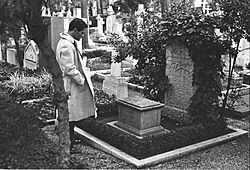
Views on Italian Society
Pasolini often caused public debate with his strong opinions on current events. For example, during student protests in Rome in 1968, he made comments that were seen as supporting the police. He explained that his sympathy was for the police because they were "children of the poor." He felt that the protesting students were from wealthier families.
Pasolini saw the 1968 protests as a minor reform within Italy's system. He believed that only the working class could truly bring about revolutionary change. He also wrote that the student movement, along with the wartime resistance, were important "democratic-revolutionary experiences" for the Italian people.
Pasolini was very concerned about the poor working class, which he showed in his film Accattone. He felt a strong connection to them. He noticed that the simple way of life he saw in pre-industrial popular culture was disappearing quickly. He called this "the disappearance of the fireflies." He believed that people's joy was being replaced by middle-class goals like owning a house.
Pasolini was also a strong critic of consumismo, or consumerism. He felt that buying too many things had quickly harmed Italian society from the mid-1960s to the early 1970s. He believed that the "new fascism" of consumerism was making everyone the same. He said that "No Fascist centralism succeeded in doing what the centralism of consumer culture did." He felt this new culture was degrading. He once said he strongly disliked the power of 1975. He felt it controlled people in a terrible way, similar to historical dictators.
Television and Culture
Pasolini was upset by economic globalization and the cultural influence of Northern Italy (especially around Milan) over other regions, like the South. He believed this was happening because of television. A TV program he recorded in 1971, where he spoke against censorship, was not shown until after his death in November 1975. In a plan for the PCI that he wrote in 1975, he even suggested getting rid of television.
Pasolini opposed the disappearance of Italy's minority languages. He wrote some of his poetry in Friulan, the regional language from his childhood, to help preserve it.
After 1968, Pasolini became involved with the Radical Party. He supported their efforts for various reforms. He continued to support the PCI, saying in June 1975 that he would still vote for them. He felt it was "an island where critical consciousness is always desperately defended."
Outside of Italy, Pasolini was very interested in the developing world. He saw similarities between the lives of the poor in Italy and in other developing countries. He believed that the struggle for change in the Third World was connected to movements in places like America.
Death
Pasolini died on November 2, 1975, at a beach in Ostia. His death was a shock to Italy. A young man named Giuseppe Pelosi was caught driving Pasolini's car. Pelosi was convicted in connection with Pasolini's death in 1976. Twenty-nine years later, in 2005, Pelosi changed his story. He claimed that other people were involved. The police reopened the investigation, but it was later closed. As of 2023, there have been new requests to reopen the case.
Pasolini was buried in Casarsa.
Legacy
As a director, Pasolini created a unique style of neorealism. He showed a sad and often harsh reality in his films. Many people did not want to see such portrayals in public art. For example, Mamma Roma (1962), starring Anna Magnani, challenged the public's ideas about morality at the time. His works, with their special poetry applied to difficult realities, showed that these realities were closer to daily life than many thought. His work helped bring about changes in the Italian way of thinking.
Pasolini's work often faced disapproval. This was mainly because of the strong contrast between what he showed and what was publicly accepted. While his poetry sometimes explored his personal relationships, it also focused on other themes. His interest in and use of Italian dialects was also notable. Much of his poetry was about his deeply respected mother. He captured parts of modern reality in a way few other poets could. His poetry was not as well known outside Italy as his films until it was translated.
Pasolini also developed ideas about language, especially related to his film studies. He believed that language, like English or Italian, is a fixed system that shapes human thought. He also thought that cinema is like a "written" language of reality. He felt it helps people see things from a truthful point of view.
His films won many awards at major film festivals. These include the Berlin International Film Festival, Cannes Film Festival, and Venice Film Festival. The Gospel According to St. Matthew was nominated for a United Nations Award in 1968.
Filmography
| Year | Title | Writer | Director | Soundtrack | Role | Notes |
|---|---|---|---|---|---|---|
| 1955 | The River Girl | Yes | No | No | — | |
| 1957 | Nights of Cabiria | Yes | No | No | — | |
| 1958 | Young Husbands | Yes | No | No | — | |
| 1959 | Bad Girls Don't Cry | Yes | No | No | — | |
| 1960 | Long Night in 1943 | Yes | No | No | — | |
| The Hunchback of Rome | No | No | No | Monco | ||
| La Dolce Vita | Yes | No | No | — | ||
| Il bell'Antonio | Yes | No | No | — | ||
| From a Roman Balcony | Yes | No | No | — | ||
| 1961 | Accattone | Yes | Yes | No | — | |
| Girl in the Window | Yes | No | No | — | ||
| 1962 | Mamma Roma | Yes | Yes | No | — | |
| 1963 | Ro.Go.Pa.G. | Yes | Yes | No | — | Segment: "La ricotta" |
| La rabbia | Yes | Yes | No | — | Documentary | |
| 1964 | The Gospel According to St. Matthew | Yes | Yes | No | — | |
| 1965 | Love Meetings | Yes | Yes | No | The Interviewer | Documentary |
| Location Hunting in Palestine | Yes | Yes | No | Himself | Documentary | |
| 1966 | The Hawks and the Sparrows | Yes | Yes | Yes | — | |
| 1967 | Requiescant | Yes | No | No | Don Juan | |
| The Witches | Yes | Yes | No | — | Segment: "La Terra vista dalla Luna" | |
| Oedipus Rex | Yes | Yes | No | High Priest | ||
| 1968 | Teorema | Yes | Yes | No | — | |
| Appunti per un film sull'India | Yes | Yes | No | Himself | Documentary | |
| Caprice Italian Style | Yes | Yes | Yes | — | Segment: "Cosa sono le nuvole?" | |
| 1969 | Love and Anger | Yes | Yes | No | — | Segment: "La sequenza del fiore di carta" |
| Pigsty | Yes | Yes | No | — | ||
| Medea | Yes | Yes | No | — | ||
| 1970 | Ostia | Yes | No | No | — | |
| Notes Towards an African Orestes | Yes | Yes | No | Narrator (voice) | Documentary | |
| 1971 | The Decameron | Yes | Yes | No | Giotto's Pupil | First in the Trilogy of Life. |
| 1972 | The Canterbury Tales | Yes | Yes | Yes | Chaucer | Second in the Trilogy of Life. |
| 1974 | Arabian Nights | Yes | Yes | No | — | Third in the Trilogy of Life. |
| 1975 | Salò, or the 120 Days of Sodom | Yes | Yes | No | — | Released three weeks after his death. |
See also
- Pasolini (film)
- La macchinazione
- List of unsolved murders
 | William L. Dawson |
 | W. E. B. Du Bois |
 | Harry Belafonte |


